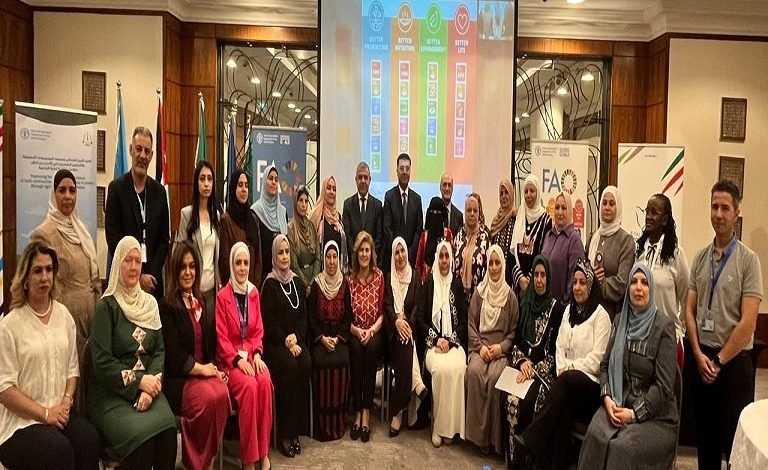
Jordan Daily – The Food and Agriculture Organization of the United Nations (FAO) in Jordan funded by the Italian Government through the Italian Agency for Development Cooperation (AICS), in cooperation with the Ministry of Agriculture (MoA), launched the project “Enhancing food security and resilience of host communities and Syrian Refugees in Jordan through today agri-food production chains” This initiative aims to strengthen the resilience of vulnerable Jordanian communities and Syrian refugees.
In a statement , the workshop was held under the patronage of H.E Eng. Khaled Al-Huneifat, Minister of Agriculture, in the presence of H.E the Italian Ambassador to Jordan, Mr. Luciano Pezzotti, and several representatives of project’s stakeholders and government partners.
In line with the agreement bi-laterally signed by the two parties, FAO conducted an inception workshop to acquaint stakeholders and programme partners with the scope and outlines of the projects, in addition to covering the implementation strategy and work plan.
The project’s overall goal is to improve the efficiency of the agricultural products and food commodities value chain, ultimately enhancing food security and livelihoods for 200 households in host communities and Syrian Refugees populations in Balqaa, Jerash, and Ajloun. Targeted households will benefit from skills development to support self-employment, increased income and improved family nutrition.
Luciano Pezzotti, the Ambassador of Italy, highlighted “Italy is proud to partner with FAO and the Jordanian government on this important initiative. The project directly addresses the critical challenges of food security and livelihoods faced by both Syrian refugees and Jordanian host communities. By promoting self-reliance and fostering sustainable agri-food production systems, we aim to empower these vulnerable populations and contribute to Jordan’s long-term development. This project aligns perfectly with the Jordan Response Plan’s emphasis on transitioning from humanitarian assistance to sustainable solutions, and we are confident it will create a lasting positive impact.”
Khalid Hneifat, Minister of Agriculture, valued the efforts of FAO and its cooperation with the Ministry within its objectives to advance the agricultural sector, and commended the cooperation and partnership with the Government of Italy and its role in supporting development projects. He pointed out that the extended regional and global crises and the resulting displacement and impact on production and supply chains, in addition to the climate crisis, made us all in need of cooperation and partnership in developing agricultural sector tools and empowering it through guidance, water harvesting and modern technologies, leading to optimal exploitation of opportunities that achieve food security.
FAO Representative in Jordan, Eng. Nabil Assaf, stated,” This project is in line with the Sustainable Development Goals (SDGs); SDG1: No Poverty, SDG2: Zero Hunger, SDG5: Gender Equality, in addition to SDG10: Reducing Inequalities.” He added, “It is also in line with the Economic Modernization Vision 2033. It supports the goals set out in key national strategies such as the National Agricultural Development Strategy 2020-2025, the National Sustainable Agriculture Plan 2022-2025, and the National Food Security Strategy 2021-2030.”
The project specifically addresses the needs of Syrian refugees and beneficiaries from the Jordanian host communities. It promotes self-reliance by providing them with the necessary “know-how” and business skills required in agri-food production. Additionally, the project offers training on transformative technologies in production and market-need assessment.

